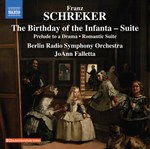|
Back
12/22/2018
Franz Schreker: Prelude to a Drama – The Birthday of the Infanta Suite – Romantic Suite, opus 14
Berlin Radio Symphony Orchestra, JoAnn Falletta (conductor)
Recording: Grosser Sendesaal des RBB, Berlin, Germany (June 19-23, 2017) – 64’10
Naxos (A co-production with Deutschlandradio Kultur) # 8.573821 – Liner notes in English and German

   
Teetering between reality and imagination is what Franz Schreker is all about. His proficiencies rivalled those of Richard Strauss, though the music took on its own distinct set of musical calculus. Because of his vast experimentation with plurality of styles, the Austro-German’s writings are like a musical bonanza bobbing away in a Brobdingnagian sea.
The best case to argue Schreker’s resume is by turning to the opening piece, Prelude to a Drama, a virtual-read of the “Ouverture” from Die Gezeichneten. Just as he did in his earlier, successful work, Der ferne Klang , the opera imbues chromaticism and coruscating colouring. While the opening remarks are borderless, pointing to Debussy in fluidity and ambiguity, the music, ironically, has more established boundaries. Use of horns creates a coarse-graded Korngold fluency, yet it’s more adventurous in exploration when thumbtacked alongside Strauss on a bulletin board. The Vorspiel motif eventually erupts (3’43) that returns later (13’09.) The entire composition beautifully resolves with a faintly-hidden Ariadne auf Naxos denouement. JoAnn Falletta goes to great lengths in eliciting lusciousness of Schreker’s composition. One example of keen detail can be traced to a soft, sinuous pocket of melody (7’08), giving one a strong sense of her grasp into the reading of the dramatic form.
There’s a close connection between Alexander Zemlinsky and Franz Schreker as we turn to The Birthday of the Infanta Suite: both landed inside the pages of Oscar Wilde’s novella. Zemlinsky’s opera, Der Zwerg , premiered in 1922 with Franz Schreker’s pantomime falling on the coattails a year later. The selection, albeit, whisks away with a ‘wink of an eye’, and the chemistry of poignant color presses edges of magical condition. While both composers utilized similar narrative structures, the point-of-devastation climaxes greatly differ: Zemlinsky generously builds with mellifluous waves and exotic élan, ending in aberrant shock while Schreker approaches in dainty steps and courts [the notes] politely with a painful and solemn farewell.
Schreker paints with charm and demure shadings. The case is upheld when entering the “Reigen” (“Dance”) that suggests Harold Arlen’s Wizard of Oz. This thought carries forth in “The Puppet Theater” (“Die Marionetten”.) The objective of finessing and toning down instrumental immensity is well expressed through bassoon whimsies inside the “Minuet” in order to usher in the dancing boys from the Church of Nuestra Señora del Pilar. The contrast couldn’t be more striking in the subsequent entrée of the dwarf. It is he, the dwarf, that Schreker comfortably settles down to ponder more cerebrally on a single page by building the doomed character with depth and composition.
The Infanta’s spurious amorous advances well-delineate under JoAnn Falletta’s direction as she executes notes with an understatement of irony and sarcastic commentary. The most heart-wrenching depiction of Der zebrochene Zwerg is realized during the tender touches of solo cello bracketed within the brief “Nachklang” (“Resonance”). We find Mlle. Falletta dignifying the score by maximizing issuances of sensitivity while re-creating an intimate persona who cherishes life through dance in an indubitable, seasonal tithing to nature.
JoAnn Falletta’s serious introspections patiently and grandly build during the Romantic Suite’s “Idylle”, clearly indicating the weightiest of the CD’s three pieces. Schreker’s “Scherzo” is a ‘Slim-Lite’ version of Bruckner’s Symphony n° 4 capricious dialogue, sans heralded brass. Berlin Radio Symphony Orchestra breaks forth on another plane inside the pseudo-religious undertones of the plaintive “Intermezzo.” One of the key nuances Mlle. Falletta engenders is her ability to ebb and flow instrumental dynamics. The harmonic stabilization during closing bars is particularly satisfying. A contrapuntal pathway into the closing “Allegro vivace” (“Tanz”) gets back to the baseline of continuous smooth sailing on the seas.
“Balance with even temperament” is the fundamental draw pointing to JoAnn Falletta on this CD. This journey into Franz Schreker’s music (especially those not well-versed) is a highly spirited and convincing one.
Christie Grimstad
|